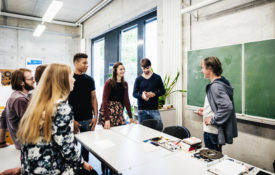-

Pursuing Best Practices in STEM Education: The Peril and Promise of Active Learning
The latest issue of Psychological Science in the Public Interest examines a promising yet loosely defined STEM instructional technique known as “active learning.”
-

Older Adults More Likely to Make the Effort to Help Others
New research suggests that, all things being equal, older adults are more likely to offer help than younger adults.
-

New Research in Psychological Science
A sample of research on political moderation, unconscious touch perception, sexual arousal in transgender men, explicit instruction and reading, emotion and memory for future events , and the reliability of functional MRI.
-
Mimes Get Us to “See” Things That aren’t There
To explore how the mind processes the objects mimes seem to interact with, researchers brought the art of miming into the lab, concluding that invisible, implied surfaces are represented rapidly and automatically. The work appears in the journal Psychological Science. “Most of the time, we know which objects are around us because we can just see them directly. But what we explored here was how the mind automatically builds representations of objects that we can’t see at all but that we know must be there because of how they are affecting the world,” says senior author Chaz Firestone, an assistant professor who directs the university’s Perception & Mind Laboratory.
-
The Mime And The Mind
When you watch a mime pull an invisible rope or run into an invisible wall you as the viewer are tricked into visualizing something that isn’t there. But is it all in the mime? Or does the mind play a role? Chaz Firestone, assistant professor of psychological and brain sciences at Johns Hopkins University joins Ira to discuss his latest research on how the mind “helps” us see these invisible objects. ...
-
Parents, Stop Talking About the ‘Lost Year’
They’re calling it a “lost year.” On and offline, parents are trading stories — poignant and painful — about all of the ways that they fear their middle schoolers are losing ground. ... They reason they’ll be fine is built right into the biology of early adolescence, explained Laurence Steinberg, a professor of psychology at Temple University and the author of “Age of Opportunity,” the influential 2014 book on adolescent brain science. The fact that middle schoolers are going through a “critical period” of heightened brain flexibility, instability and plasticity, he said, means that they are hypersensitive and ultra-vulnerable — and also extra-primed for adaptability and resilience. ...

